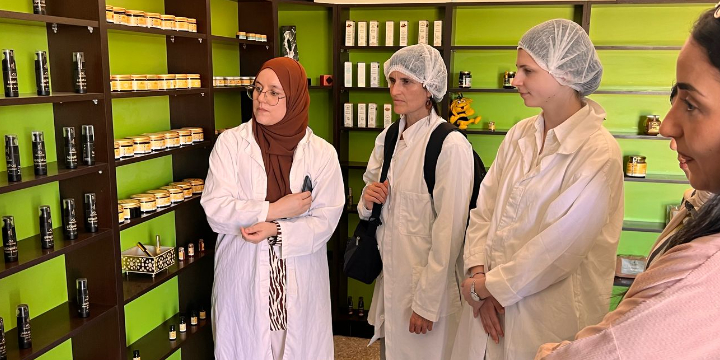
Biosphere Reserves serve as living laboratories where sustainable development is actively tested and demonstrated, balancing biodiversity conservation with socioeconomic progress. This approach is particularly relevant in the Mediterranean region, where environmental pressures like climate change and biodiversity loss are intensifying. The MedMAB Network and the UNESCOMED Centre play a key role in fostering collaboration and innovation across the region’s BR, supporting local activities that integrate nature-based solutions with community wellbeing.
As part of the RES-MAB project, two researchers based at the International University Campus for Mediterranean Biosphere Reserves – Melina Mekic (UAB) and Marta Rovira (CTFC) – visited Morocco’s Arganeraie Biosphere Reserve on April 14-15. Their research focuses on sustainable market solutions and business models.
Interview with Melina Mekic: Exploring Sustainability through Local Knowledge in Morocco’s Arganeraie Biosphere Reserve
Q: Can you tell us about your master’s thesis?
I'm currently completing a Master’s in Interdisciplinary Studies of Environmental, Economic, and Social Sustainability at the Universitat Autònoma de Barcelona, with a focus on Global Change. My thesis explores how local knowledge contributes to innovative and sustainable business models, using a participatory research approach.
The study is based in the Arganeraie Biosphere Reserve in Agadir, Morocco. This UNESCO-designated site promotes sustainable development by balancing nature conservation, local livelihoods, and science. I conducted interviews with local businesses, including women’s cooperatives producing argan oil, as well as organizations involved in forest management and reforestation.
The main goal is to understand how local perspectives can address social, environmental, and economic challenges—especially in a region where drought and water scarcity are growing concerns. We're looking at how communities manage resources like water and energy, and how their practices can inspire broader sustainability solutions.
Q: How did visiting the Arganeraie contribute to your thesis?
The visit was crucial. It allowed me to engage directly with the people most affected by climate change. Their lived experience offers deeply adapted, practical solutions. I learned about local irrigation systems, reforestation efforts, and education initiatives—particularly for women and youth in areas with low literacy rates.
The strong cultural and economic connection to the argan tree really stood out during my visit. It’s more than just a product—it represents tradition, resilience, and identity. Many traditional methods of producing argan oil are still in use, supporting both livelihoods and biodiversity.
The visit unveiled how everything is interconnected: environmental health, social equity, economic opportunity, and cultural heritage. This experience reaffirmed the need for interdisciplinary approaches that include not just scientific knowledge, but also the voices of local communities. They are essential to building more inclusive and effective sustainability solutions.
Interview with Marta Rovira: Sustainable Business Models in the Arganeraie Biosphere Reserve
Q: How does your PhD research connect with the RES-MAB project?
My research is strongly aligned with the RES-MAB project’s mission to enhance the resilience and sustainability of Mediterranean biosphere reserves. We both focus on supporting small and medium-sized enterprises (SMEs) and fostering nature-based economies.
Specifically, I explore sustainable and innovative business models that combine non-wood forest product (NWFP) value chains – like those involving medicinal plants or argan oil – with community-based ecotourism. The goal is to show how SMEs can generate economic value while remaining committed to environmental conservation and social equity, which is central to RES-MAB’s approach.
Q: What kind of impact do you hope your research will have in the Arganeraie Biosphere Reserve?
My aim is to support the sustainability and resilience of local cooperatives, small businesses, and communities in the Arganeraie Biosphere Reserve. During our field visit, I interviewed a local association and two women’s cooperatives, gaining first-hand insight into their day-to-day challenges and opportunities.
My research proposes practical strategies to strengthen these initiatives – such as diversifying income beyond argan oil through community-based ecotourism, improving market access, and developing sustainable certification systems. Capacity-building is another key focus.
Q: What makes your work particularly relevant for the local context?
This work amplifies local voices and ensures that recommendations reflect the community’s own priorities. It also offers a replicable model that could inspire other biosphere reserves to support local entrepreneurship while promoting sustainability. The idea is to foster economic growth that’s both inclusive and deeply rooted in the territory.